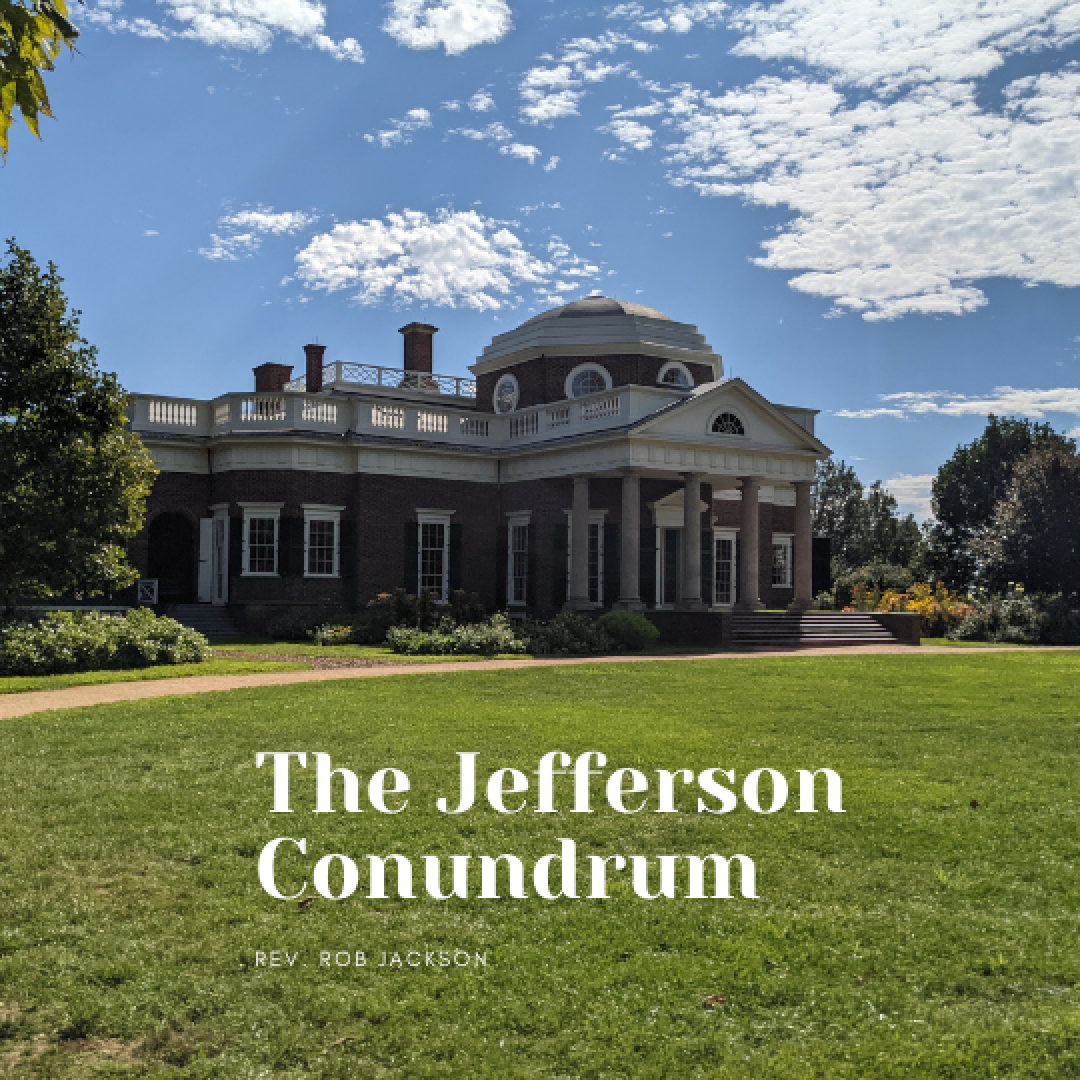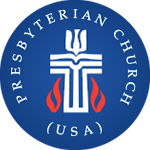
The Pastor’s Word: The Jefferson Conundrum
Over the Labor Day weekend, our family took a wonderful trip to Virginia, where we visited Monticello, the home of Thomas Jefferson. Among the “Founding Fathers” Jefferson was a standout. He was the third president of the new United States, vice president, secretary of state, diplomatic minister, and congressman, not to mention an architect, lawyer, writer, farmer and scientist. Jefferson was instrumental in the Louisiana Purchase, and he was a champion of the Lewis & Clark explorations (Thomas Jefferson, a brief biography, 2021).
However, Jefferson was the proudest of three things: Being the primary author of the Declaration of Independence, the author of the Virginia Statute for Religious Freedom, and Founder of the University of Virginia. Of those three things, he felt he had a unique claim in his nearly five decades of public service. Even in death he was cloaked in early American patriotism, dying on July 4, 1826, on the same day as his colleague, advisory and friend, John Adams, which was also the 50th anniversary of the Declaration of Independence.
To take a tour of Monticello is to take a walk through early American History, clothed in splendid architecture, relics from around North America and the world, odes to political thinkers through the generations, bodacious landscaping, gardens, and breathtaking views. There are live crops, grown in a historically accurate manner to represent the farm life. And, if one stands in front of the house in the right spot, it is possible to see the rotunda of the University of Virginia in Charlottesville, the creation of which was one of Jefferson’s crowning achievements.
However, there was another, seedier side of Monticello. The entire estate was a plantation, run on the backs of slaves and built by their hands. On paper, Jefferson was against slavery. He declared that “The whole commerce between master and slave is a perpetual exercise of the most boisterous passions, the most unremitting despotism on the one part, and degrading submissions on the other.” (Jefferson, Jefferson quotes & family letters). Simultaneously, he benefitted from slave labor in his residence, in his financial endeavors, and his slaves were instrumental in his travel and work as a politician. How could the author of the document that declared inalienable rights of life, liberty and the pursuit of happiness own 600 people? Even the official Monticello website calls this a “Paradox of Liberty” (Paradox, 2021).
On our tour of the slave experience at Monticello, our guide Historian Bill Bergen laid out for us the disturbing history of slavery on site. All of us wanted to find a silver lining, some shred of dignity upon which to hold to let Jefferson off the hook for his travesty, as he had done so much for the founding of our nation. The questions came right after another, all seeking the same answer. How could Jefferson believe in freedom, abhor slavery, and yet still participate in it?
Some would ask, “Did he think that because he treated slaves well that he was somehow above the criticism?” The guide asked us, “What does it mean to treat a slave well? The answer is that there is no such thing as a well-treated slave…because they are a slave!” Bergen went on to tell of documented horrors that happened to various slaves at the hands of the slave masters hired by Jefferson. Some pointed to context. In Colonial Southern America, slavery was common. But Jefferson’s own writings pointed out that he thought it was wrong. And, sadly, he bought into those terrible theories that whites were superior humans to those who were of color. In the end, our tour guide told us that he could not give us what we wanted, a way to understand the enigma of Jefferson. He could only give us the complicated, documented history. Jefferson ducked opportunities to speak against slavery late in life, charging the younger generations to handle it. Jefferson himself saw no practical plan to make it happen without ruining the economy and enraging the most wealthy and powerful people in the land. (Bergen, 2021).
I left Monticello conflicted. I admired so much of what Jefferson accomplished, and I feel our nation owes him a debt of gratitude. Also, my admiration is challenged, wondering if all of Jefferson’s good was overshadowed by his slave-holding? There seems to be three histories of Jefferson: the one of the amazing Founding Father, the one of a hypocrite slave-owner who lived lavishly at the expense of others, and then some more sophisticated accounts which hold all of the truths together. It is easy (and just) to cast blame and shame on Jefferson. But here is the challenge embedded in complicated history:
“Do not judge, so that you may not be judged. For with the judgment you make you will be judged, and the measure you give will be the measure you get. Why do you see the speck in your neighbor’s eye, but do not notice the log in your own eye? Or how can you say to your neighbor, ‘Let me take the speck out of your eye,’ while the log is in your own eye? You hypocrite, first take the log out of your own eye, and then you will see clearly to take the speck out of your neighbor’s eye. - Matthew 7:1-5
Jesus warns us all that our judgement upon others brings scrutiny upon ourselves. This does not mean we ignore the truth of Jefferson. It certainly does not mean that we idolize him without scrutiny. But it does bring attention to our own time. Are there things that we do now that we think are fundamentally wrong, but we cannot practically think of a way around them? As Christians, we oppose violence, yet we war. As Christians, we are called upon to care for the poor, but there are many who go without proper food, clothing. housing and medical attention. We are against racism, yet we struggle to find ways to study and fight racism within our society. We are pro-opportunity, but the top 1% of Americans hold a disproportionate amount of the wealth, SIXTEEN times more than the bottom 50% of Americans. We are against the mistreatment of children, yet we do not properly fund our schools and our teachers. We are against the destruction of the environment, commanded to be stewards of creation, yet we cannot find a feasible way to reverse harmful practices, from our cars to our trash, we burden our planet.
This is the point at which I can hear the complaints arise: The preacher is getting too political. But every injustice has political implications. So, it is impossible to steer clear of that which is political. However, pastors can (and should) stay away from partisanship. I hold no allegiance to a political party. But there are moral demands, given to us by the Gospel which speaks to all of these things: economy, violence, treatment of the poor, healing the sick and loving our neighbor. It is the Pastor’s job to point toward these things.
Another way to think about this is to look into our future: At what point will our descendants take a historical tour of our one of our generation’s historical sites, see all of the amazing things we accomplished, and then the hard history comes, and truths are told about how we failed? What log is in our eye, that we cannot see while we judge other generations? Or, maybe a kinder way of saying it is, What are our “blind spots?” This is the Jefferson Conundrum.
We can see how Thomas Jefferson was amazing, but he participated in morally bankrupt things. He was caught between his beliefs and the practical nature of the world. Are we willing to take account of our own selves and ask the hard questions about our own participation in powers and principalities that are problematic? Just as there are three histories of Jefferson, there will be three histories of us as well. There will be the one that tallies our greatness. There will be the ones who only see how we went wrong. Finally, there will be the complicated history that captures the complexities of it all. Complex histories are not as fun to study because they do not let us create heroes and villains. All are fallen and fall short of the Glory of God, as Paul would tell us. So, we must bring this scrutiny both to our history and to our own selves. Where are the gaps? What is to be done? And how have we fallen into the traps of the powers and principalities to do things that we would not otherwise choose to do on our own? Stay tuned for my next article: The Powers and Principalities and Why They Matter to People of Faith. God bless you all, and may we all strive to live into our calling as disciples of our Lord, Jesus Christ!
Grace and Peace,
Rob
Works Cited
Bergen, Bill. “Slavery at Monticello.” Jefferson Monticello. Slavery at Monticello Tour, 4 Sept. 2021, Charlottesville, VA , Monticello.
Jefferson, Thomas. “Jefferson Quotes & Family Letters.” Extract from Thomas Jefferson's "Notes on the State of Virginia," 1782 [Quote] | Jefferson Quotes & Family Letters, 2021, tjrs.monticello.org/letter/1317
“Paradox of Liberty: Slavery At Jefferson's Monticello.” Monticello, Jefferson Monticello, 2021, www.monticello.org/slavery/paradox-of-liberty.
“Thomas Jefferson, a Brief Biography.” Monticello, Jefferson Monticello, 2021, www.monticello.org/thomas-jefferson/brief-biography-of-jefferson/.

